This essay was translated into English by Maryam Iraj as part of MULOSIGE’s Translations project. This project includes translations of essays of world literature from Urdu to English, as well as an our archive of translated Progressive and Modernist Urdu Poetry.
Songs of the Geishas: “gīshaoun key gīt”

Mohammad Sanaullah Dar, better known as Meeraji (25 May 1912 – 3 November 1949).
“gīshaoun key gīt” from: Mashriq o Maghreb ke naghme (Songs of East and West)
by Meeraji/ Mohammad Sanaullah Dar (1912-1949)
.
Translated into English by Maryam Iraj
To find the original essay in Urdu, please turn to pages 543-555 here.
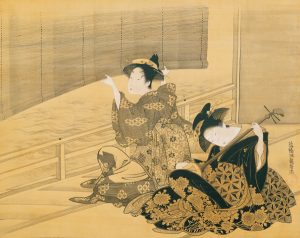
Courtesan Playing the Samisen – Isoda Koryusai c. 1785. Courtesy: Wikimedia Commons
These songs are in the ancient fashion of Japanese poetry, and a few of the songs are incredibly famous. Irrespective of the time of a song’s creation, it comes to life once it is presented in the everyday life of people. These songs are sung or hummed on befitting occasion with the help of a delicate a three-stringed, rubab-like musical instrument called the “Shamisen”.[1] The elegant tinkling of the shamisen evokes a cosmic echo in the heart of a Japanese man. And this echo reawakens the the love story of a teahouse that had long been consigned to oblivion, or reminds of a long forgotten romance that once took place in private quarters in Yoshiwara. Their notes are not upbeat or loud but rather elegant, subtle and, to an extent, sharp and piercing.
Every geisha plays the shamisen and sings this song, and in these very episodes, we get fragmented glimpses of these Japanese courtesans and their tortured and sad lives. [2] If there were to be a poetic name attributed to these songs, it would be “awaited”. [3] The distant thought with which these women struggle is that of being, one day, married to a kind hearted customer and thus freed of their sexual labor and a joyless life. She keeps waiting for the day when her future husband will visit the courtesan house and release her from her captivity after paying the predetermined amount to the mistress of the house.
Owners of courtesan-houses buy girls in their adolescence from their impoverished and greedy parents. For a long time, or at least their entire youth, these girls spend their lives serving these bonds. This business is not considered trivial in Japan, the period of training for a courtesan is long and onerous; they must learn to dance, to sing, to play at least one instrument skillfully, and to be well-versed in all manner of customs and fashions as, for example, in the art of tea-ceremonies, fashion, comportment and floral arrangement. A courtesan must observe such etiquettes with grace and an elegant disposition.
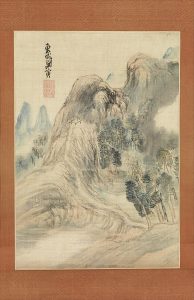
Autumn Landscape, Yosa Buson (1975). Courtesy: Wikimedia Commons
We can discern an all-encompassing passion in these songs, as we can in all Japanese poetry. In fact, all variety of Japanese cultural phenomenon are characterized by this same fascinating mannerism. As the Japanese courtesan’s education is achieved through steady method and careful arrangement, the overwhelmingly romantic quality of these Japanese songs exhibits as a kind of flaw or imperfection. It is widely agreed that, for a Western scholar, translating a Japanese song is like capturing the moves of a dancing-star. A number of emotions and feelings burst forth in the Japanese heart and within them, particularly a special few. For example, the song of a Koel evokes the emotions of sadness (and this is true in Hindi poetry as well). In Japanese theatre dramas, the sound of the Koel symbolizes tragedy or is a bad omen, warning the spectators of impending trouble. The presence of the moon reaffirms love. Autumn suggests mutually-strained relations between the lover and beloved. Apart from this, “makurakotoba” (literally, pillow words) or figures of speech carry certain meanings. For example, “lady” and delicate” and “easy” and “eternal”. In addition to these, the art of double entendre is also a beloved practice. Apart from this, there are many words that are used as a tool to redirect the reader from one thought to another. And there are also synonyms exclusively used for rhyming.
It must be notes that these songs by geishas were not written under some set of rules or method of versification, as is the case with the rest of Japanese poetry. These Japanese songs were written in the fashion of our own rural songs. The songs of the geishas are difficult to translate in comparison with other Japanese poetry. But in terms of their neatness as sketches, these songs are more advanced than other forms of poetry. And we also find more passion and delicacy of thought in them. And because the writers of these poems, like the writers of rural songs, did not associate with the common orders of religion, education, and civility, in these poems we find a natural simplicity blended with the slight glimmers of poetic affectation to give a strange lightness and candor.
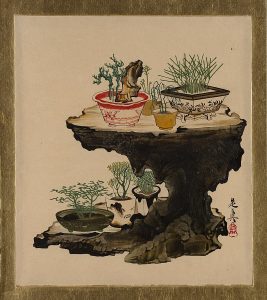
Lacquer Paintings of Various Subjects – Bonsai, Shibata Zeshin. Courtesy: Wikimedia Commons
The tendency towards restraint is a common trend in Japan. For example, the constricting of feet for women (or foot-binding) is a fashion. From methods of constraining giant trees to artificially grow as dwarfed plants [4] to forcefully bringing these human butterflies from the wide expanses of Japanese villages to be caged in a laborious life sentence at Yoshiwara, all this manifests a distinct taste for confinement. Hence, it is only natural and inevitable that the inhabitants of those cells will effected by their restrained environment. And so their feelings are unveiled in a terse and constrained manner. While small feet might be the source of a joke in other cultures, and tree-like small plants might carry a different connotation in different countries, the sentiment of oppression and enslaved can, nonetheless, be understood worldwide. There is a universal appeal to these songs which any human being can appreciate with fondness and freewill.
The following songs have been translated in the fashion of English free verse to retain the asymmetrical quality of these songs. The theme and spirit of the subjects of these poems are specifically focused. In some instances, an Indian equivalent has been given in place of the Japanese example to avoid the unpleasant hindrance which unfamiliar lexicon can create during reading.
Style
.
Fluttering like a butterfly
Like a falling leaf in waltz
How should I dance?
.
Union
.
These two hearts, this intimacy
So far from anyone, from life
Silence, it is peaceful!
She says, “listen to the songs of the winds”
“the branches of Juniper are also swaying.”
.
Solitude
.
I wake up and watch,
I sleep and watch,
Lost in the vastness of the curtains of my canopy bed!!
.
The Betrayal of Sleep
.
These dream encounters
A sadness prevails on them!
The moment, woke up suddenly,
Extinct was that conversation,
That fleeting touch!
.
Memories of the Past
.
Autumn arrives and capture the hearts of people
Enduring reflections of those moments
I’ll never forget them, I’ll never forget them
.
Small, Golden moments
.
Forgotten midnight
And she just rose from a deep sleep
Looking around, here and there
For no one was found
Only a swing stretched with arms open
Swaying back and forth
.
Separation
.
Rainy days of the monsoon
A lone woman looks out of the window of her house
.
My Heart
.
My heart—my heart, this rain of the monsoon!
This swing of life is pert and playful
In the haze of dark skies, someone is lost!
Someone, gracious!
Someone, graceful!
But I am not the beloved of the fate
And leaves are fallen with the vernal winds
Should I stay alone my entire life
Somewhere, a koel sings on tree!
This monsoon rain, my heart! My heart!
Banks
.
Clothes drying in the sun,
Peaceful times are approaching?
.
The End of the Night of Pleasure
.
First few drops of eternity
Cry of the koel, inflicting anguish,
The time has come,
of separation
.
An Ascetic Woman
.
She never left her home and yet
But she comes in the rainstorm,
Forsaken!
to the stairs of the Mandir! [5]
.
Lament of the Unrequited Love [6]
.
Pale and a withered day!
Is rupturing the confines
To cloak the evening ambiance
The same way my heart is ruptured
With a dagger pierced through my heart, and leaving me crestfallen!
And I start counting those beam strings,
Those, that are touching the confines to be versed in!
And I keep counting these beam strings, incessantly!
Lost and adrift—!
.
A Reposed Evening
.
A congregation of evening pleasures!
And I wore flowers in my hair,
Alas! He did not return!
And I languish in wait for him,
This is the habit of time
These effete and burnt days
Such barren days in abundance,
All collected to make a year!
.
Ablution
.
Today, I bathed myself in the water!
My body in the pure waves of the river!
Now our souls have been purged of mutual aversion
Yes, absolved!
And he came to entangle my hair
And my entire world has been ruffled!
He might consign me to oblivion!
But I shall never forget!
I am waiting for spring!
To arrive and reveal our ecstatic hearts!
Transient
.
Alas, this is mortal love, and myself
As I dream of the river-expanse!
As we rowed the boats, and were guests to the moonlit-night!
This confined and finite body, alas!
And the infinite array of thoughts accompanies!
These events of my life,
Hardly listen to my heart?!
And I envision him in my dreams,
Sitting on my abandoned wedding-bed,
Thus, temple bells start ringing!
.
Darkness
.
The night is dark
And the strings of my heart
Aroused from a deep sleep!
My heart is gushing with passion
And you ask me to bear solitude
Moans in the deep night! Hidden are many mysteries!
And dark is the knot of dreams!
On a wedding-bed of black, black shadows!
Our conversation lost to whispers!
Alas, lost this way!
.
The Intoxication of flowers
.
The bearer brings from the lover
A bough of jamsine
And forgets the message!
.
Spring in the Garden
.
I arrive at the garden
to bear witness to the blooming flowers
But witness the drawn flower-curtains all around!
.
Loneliness
.
He will be approaching with flowers held in his hands,
To tread this tender and pure path!
That night the sky will be moon-lit!
.
Tears of Yumna [7]
.
Strides of Yumna, slowly, slowly, and ever lighter!
And blooming buds on its shores!
A raga heard in the efflorescent buds!
Like a raga flowing from a Koel’s melodies!
Buds euphoric with the wild-fragrance, and Koel intoxicated with the songs!
Waves and winds dancing, and flowing from bough to bough!
We are meeting today; agony of separation will be consigned to oblivion!
And our gently cruising boat will touch the shores, one day!!
[1] The author is identifying Shamisen as a rubāb”, which is a musical instrument played in Western Asia, especially in Afghanistan and in the Northern areas of Pakistan.
[2] Although Meeraji repeatedly uses the word ‘ranḋi’ (or prostitute) to describe the geisha, we have opted to retranslate this word as courtesan as it better befits the social and historical situation of these women in premodern Japan. It is somewhat surprising that Meeraji did not consider to compare the geishas to tawāif, since he routinely provides South Asian equivalents to Japanese situations. In fact, we believe the social and economic parallels between the courtesans of feudal South Asia (tawāif) and feudal Japan (geisha), would have allowed for a meaningful comparison of the role of poetry and song writing in both labor-communities.
[3] The Urdu word that Meeraji uses is muntazir which can also be translated as expectant.
[4] Meeraji seems to be referring to the art of bonsai
[5] A Hindu temple
[6] The poet used the term Wasokht “واسوخت” for the title. This term refers to a particular genre in Urdu poetry characterized by impassioned and unrequited love, and the complains which lovers make. Literal meaning of the word also refers to “fire” and “spark”.
[7] The Hindi pronunciation of Yamuna is “Jamuna”. It is the second-largest river of the Ganges, and begins in the Himalayas and flows through Northern India.



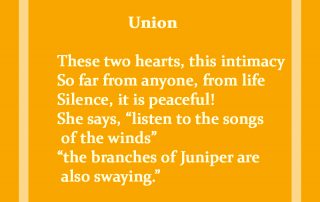
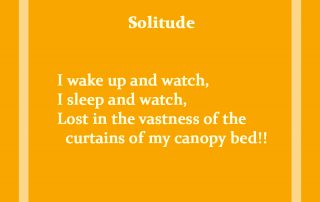

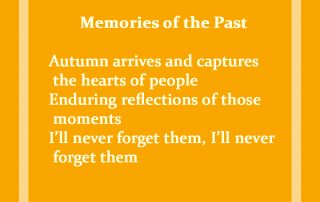
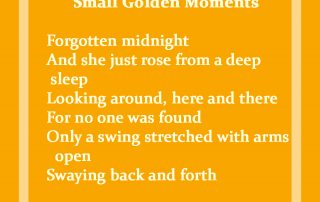
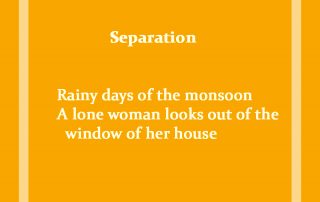

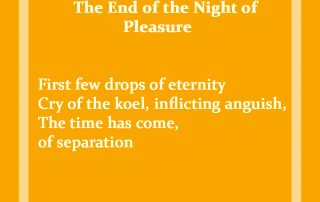
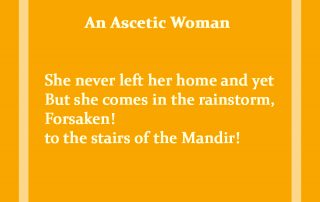
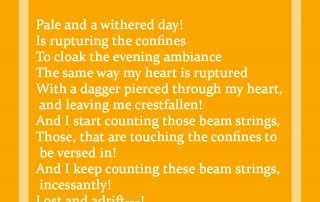
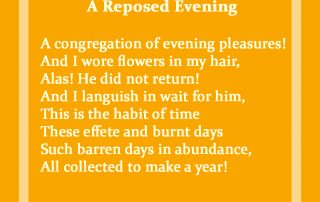
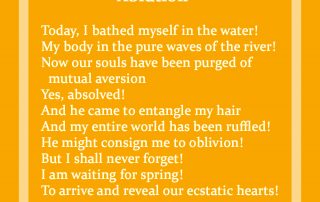
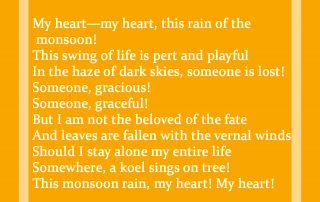

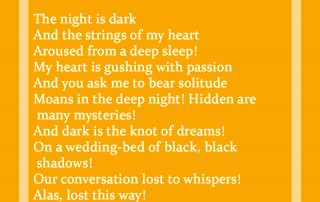
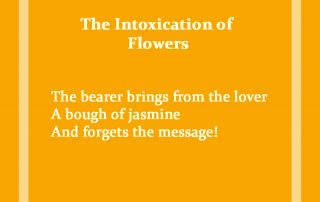
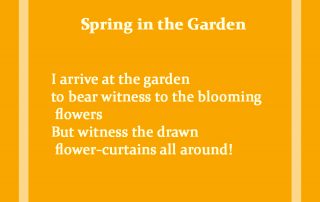
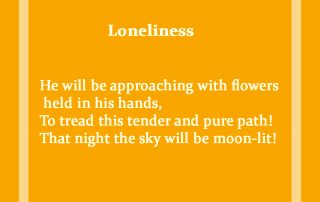
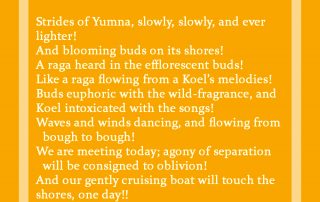
Leave A Comment